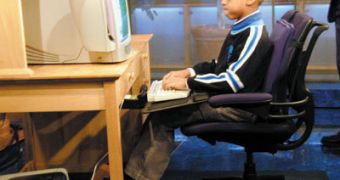Now, this crap won't make your child a brainy Hawkings but on the contrary, dumb as a rock. Encourage your child to learn language from DVDs and videos like "Baby Einstein" and "Brainy Baby" and he/she will hardly manage to express himself/herself...
A new research made at the University of Washington and Seattle Children's Hospital Research Institute has found that the over-use of such productions actually delays vocabulary acquiring in infants who are 8 to 16 months old. For every daily hour spent watching baby DVDs and videos, the toddlers aged 17 to 24 months missed an average of 6-8 words compared with children who did not watch them.
"The most important fact to come from this study is there is no clear evidence of a benefit coming from baby DVDs and videos and there is some suggestion of harm. The bottom line is the more a child watches baby DVDs and videos the bigger the effect. The amount of viewing does matter." said lead author Frederick Zimmerman, a UW associate professor of health services.
The same team had revealed that by 3 months of age 40 % of children regularly watch TV, DVDs or videos and by the age of 2 the percentage jumps to 90 %.
The team made random telephone interviews, 45 minutes each, with over 1,000 families in Minnesota and Washington, having an 8 to 24-month-old child.
TV, DVD and video viewing were classified into four categories: baby DVDs and videos; educational TV programs, DVDs and videos like "Sesame Street, "Arthur" and "Blue's Clues"; children's non-educational television shows and movies like "Sponge Bob Square Pants," "Bob the Builder" and "Toy Story," and adult shows like "The Simpsons," "Oprah," and sports programming. There were no positive or negative effects on children of either age group from watching educational and non-educational media or adult TV programs.
"The results surprised us, but they make sense. There are only a fixed number of hours that young babies are awake and alert. If the 'alert time' is spent in front of DVDs and TV instead of with people speaking in 'parentese' - that melodic speech we use with little ones - the babies are not getting the same linguistic experience," said co-author Andrew Meltzoff, co-director of the UW's Institute for Learning and Brain Sciences.
"Parents and caretakers are the baby's first and best teachers. They instinctively adjust their speech, eye gaze and social signals to support language acquisition. Watching attention-getting DVDs and TV may not be an even swap for warm social human interaction at this very young age. Old kids may be different, but the youngest babies seem to learn language best from people," he said.
"In my clinical practice, I am frequently asked by parents what the value of these products is. The evidence is mounting that they are of no value and may in fact be harmful. Given what we now know, I believe the onus is on the manufacturers to prove their claims that watching these programs can positively impact children's cognitive development." said co-author Dr. Dimitri Christakis, a pediatrics researcher at Seattle Children's Hospital Research Institute and a UW professor of pediatrics.
Parents of 8 - 16 months old children were questioned about how many words, chosen from a list of 90 words (like choo choo, mommy and nose), were understood by their child.
In the case of 17 to 24-month-old toddlers, parents were asked how many words from a specific list (including words like truck, cookie and balloon) they had heard their child pronouncing.
"Parents also were asked about how often they read books or told stories to their children. Daily reading and storytelling were associated with slight increases in language skills, not a surprising finding since both activities foster language development," said Zimmerman.
Baby DVDs and videos differ from the other materials because they have little dialogue, short scenes, disconnected pictures and present linguistically indescribable pictures like a lava lamp, while children's educational programs are modeled to meet developmental needs of preschool offspring.
"We don't know for sure that baby DVDs and videos are harmful, but the best policy is safety first. Parents should limit their exposure as much as possible. Over the course of childhood, children spend more time watching TV than they do in school. So parents need to spend as much time monitoring TV and other media viewing as they do in monitoring their children's school activities." said Zimmerman.
The team thinks more investigation is required, particularly to see the long-term impact of baby DVDs and videos on toddler's cognitive skills.

 14 DAY TRIAL //
14 DAY TRIAL //